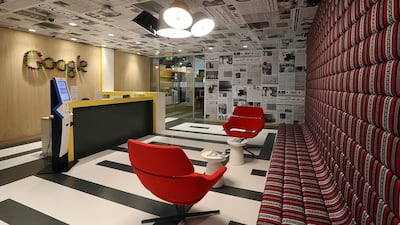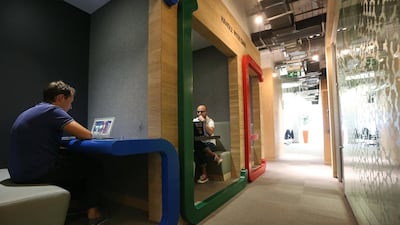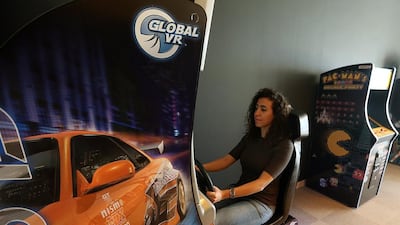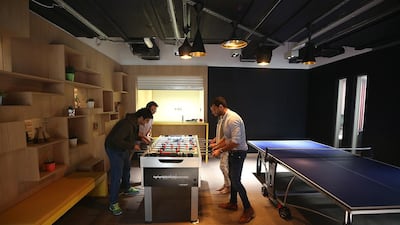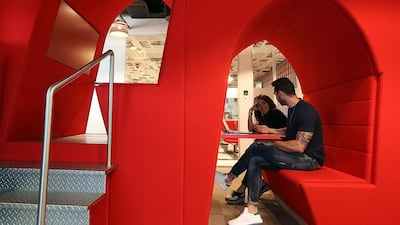It is hard to think of a company that has more effect on our daily lives than Google. Even going to Google’s Mena headquarters in Dubai involves quite a lot of, well, Google.
I send an email – using Gmail, of course – to head of communications for the Google in Mena, Joyce Baz, telling her that I’m setting off.
I put the office’s Dubai Internet City address into Google Maps, and get into my car – which, if Google gets its way, a decade from now will be one that drives itself.
Out of Google’s 70,000 employees working in 40 countries, about 150 are in Dubai – there are 31 nationalities and 40 per cent of them are women. The office was opened with a staff of five in 2008.
In reception, with walls that are decorated with Arabic newspapers, I first check in to a machine before I can enter the offices. It tells me firmly not to discuss or share any confidential information I might see or hear during my visit. No video is to be taken, nor photos of the open offices.
These rules might seem a little paranoid, but the stakes are high in the ultra-competitive tech sector. Google is involved in a US lawsuit accusing Uber of stealing trade secrets.
“There are access controls and confidentiality agreements, as with any tech company,” says Jordanian “Googler” Najeeb Jarrar.
“We also want to keep that element of surprise and delight for the users, so details aren’t leaked.”
Mr Jarrar, who is head of consumer marketing, was based at the company’s US headquarters before moving to the Dubai office in 2014.
“Even though you see the pictures beforehand, you still get a shock when you first walk into the Googleplex,” he says. “I used to live in San Francisco and we had shuttle buses with free Wi-Fi to take us to the campus – that was revolutionary back then.”
Mr Jarrar recalls the free laundry service and invitations to talks by visiting movie stars. But the best perk, he says, was the calibre of his colleagues.
“I had an engineer sitting opposite me who had an Oscar for visual effects on his desk, and we had a couple of astronauts in the office as well.
“In my entire career at Google, I can count on one hand the number of people I’ve met who did not impress me,” he says.
Google hires its employees based on their “Googliness”, which seems to mean different things to different employees. For Ms Baz, it means being humble, fun and taking ownership of your work.
Lino Cattaruzzi, who is managing director for the Mena region, says Googliness is unique.
“I’ve been with the company for some years and only now do I fully understand what it is. To a certain extent, it’s how likely you are to thrive in our culture. We are open and there are a number of values that we stand behind.”
Rather than being glued to a screen, as you might expect at a tech company, most of the Googlers I see as I walk around the office are engaged in group video conferences. These Dubai staffers mostly resemble young students, dressed as they are in jeans and trainers, according to Google’s flexible dress code and starting time policy.
Google’s Dubai offices are smaller than the Googleplex – although there are expansion plans – but staff still get their fair share of perks.
One of Ms Baz’s favourites happens twice a week, when Google brings in therapists to massage their employees in a specially decked-out room. Massage credits are given out as reward points to staff, Ms Baz.
“On your birthday you get extra massage points,” she says.
“For people who aren’t very ergonomic in the way they sit, all they need is their back cracking – it makes such a difference.”
There is also a nap room, although Mr Cattaruzzi hastily tells me that he does not expect staff to come to work and sleep for hours.
“But if you’re tired and you want to take a 60-minute nap, we have no issue. Sometimes we work really hard, and being able to take a quality break makes a big difference.”
The office decor is locally influenced, from a display of Emirati Russian doll ornaments, to the naming of all the many video conferencing rooms after Arabic cartoon characters.
In the belief that creativity can be sparked by a change of scenery, aside from the assigned office desks there are plenty of collaborative areas, featuring children’s play equipment, exercise balls and standing desks.
The layout means that junior staff sit next to senior people.
“It’s important for the senior staff to showcase how they reached a decision, which is a great learning opportunity for the juniors,” Mr Jarrar says.
Although the Dubai office lacks its own gym, off-site memberships are reimbursed. Yoga is offered on alternate Sundays.
In the games room, a group of Googlers are enjoying a game of table football. “Sometimes it gets so loud in here on a Thursday afternoon, I can’t hear myself,” Ms Baz says.
There is also a range of retro video games, including Mr Cattaruzzi’s favourite, Pac-Man.
“My eight-year-old son only wants to come here to play with me on that,” he says.
The underlying principle behind all these perks is not just to keep staff happy, but to help them concentrate on work, Mr Cattaruzzi says.
“We remove the worries, so instead of having to think about where you’re going to have lunch, the food is here. We can also give you cooking lessons. It goes way beyond just coming to work to do your job – you belong to a community.”
The Google cafeteria, Arabesque, plays lounge music and has a selection of free, nutritious meals, including fish, coconut water, a salad bar and dark chocolate. There are two stocked micro-kitchens for use during breaks.
It must be tempting for employees to smuggle food out for home and Ms Baz says: “We don’t stop them. But people know that this is for use at the office.”
Hala Ajil, an Iraqi-British YouTube partner manager, says she gained weight while working in the London office because she used to eat chocolate all day.
“But in Dubai, the lifestyle is more crazy-fitness, so I wake up at 5am and go to the gym at 6am, and I love all the healthy food.”
It’s not surprising, then, that she loves her job. “It’s cosy, hectic, crazy, fun, and I actually really like it,” she says. “I wake up in the morning and I’m excited to come to work – and not many people can say that.”
_____
Besides the core online advertising business, here are some initiatives that Google’s Dubai office is working on:
Supporting Arabic content on the web
From apps to online video and e-books, Google is playing its part in encouraging more Arabic content on the web. There are now more than 10,000 books in Arabic on the Google Play store, with the amount of Arabic content uploaded online growing by 40 per cent last year. A designated Youtube studio is opening later this year in Dubai Studio City which will support the production of more Arabic videos.
Getting historical landmarks on Google Maps/Street View
Google has so far captured five major landmarks in the region on Street View: Burj Khalifa (2013), Sheik Zayed Grand Mosque in Abu Dhabi (2014), Giza Pyramids (2014), Liwa desert in Abu Dhabi (2014) and Petra (2015). They’ve also put the first Street View trekker on a camel. With the exception of Abu Dhabi, Google has captured street-level imagery of six emirates.
Building digital skills for the future
Google has an ongoing coding programme, Computer Science First, in partnership with the Abu Dhabi Education Council. More than 200,000 students have so far taken the basic coding class in schools. They also have an innovation hub in Ras Al Khaimah.
Mentoring start-ups
Google launched an Entrepreneurs Tech Hub in 2014 with Astrolabs, supporting 80 startups from 46 nationalities. Last year, more than 4,000 entrepreneurs were trained at Astrolabs.
Empowering women on YouTube
Female content is one of the fastest growing verticals on YouTube in MENA, growing by 75 per cent last year. Google recently launched a YouTube hub called Batala, (a female hero in movies), to promote female-led content.
newsdesk@thenational.ae
